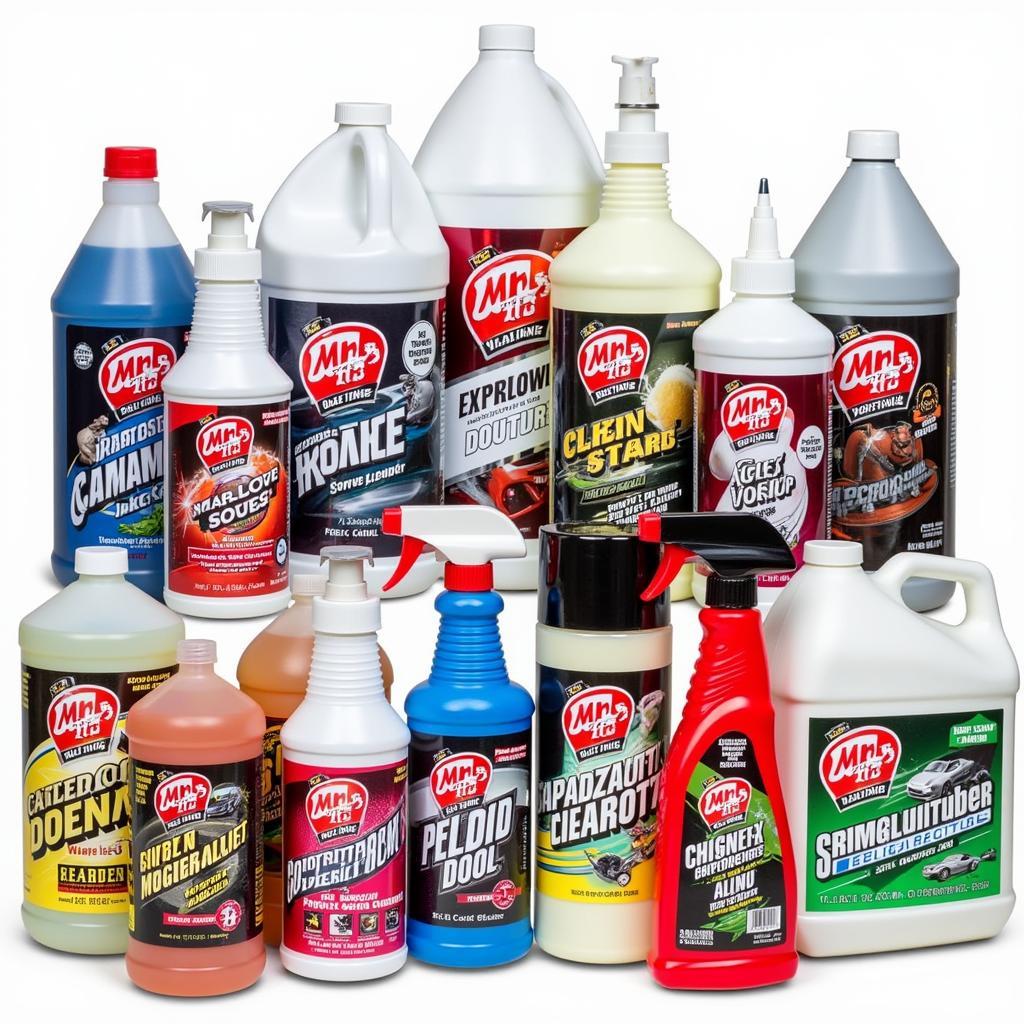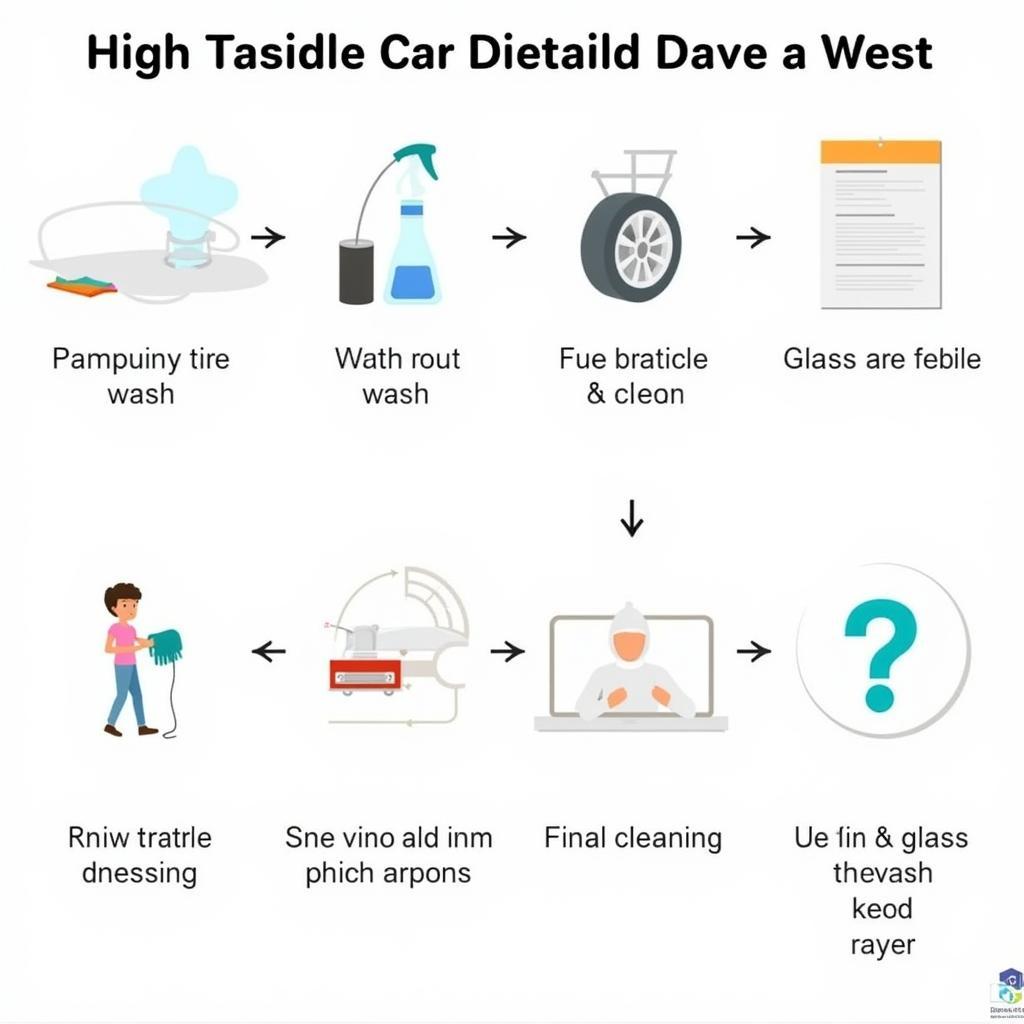Dealerships understand the power of presentation. A gleaming car is far more appealing to a potential buyer, and that’s why detailing is a crucial part of their pre-sale process. So, What Do Dealerships Use To Detail Cars? Let’s dive deep into the world of dealership detailing and uncover the tools, techniques, and products they employ to make cars showroom-ready.
Want to achieve that professional dealership shine at home? Check out our guide on how to detail a car at a dealership.
Dealerships invest in a range of equipment and supplies to achieve professional-level results. This goes beyond a simple wash and wax. They utilize specialized tools and techniques to address every aspect of a car’s appearance, from the paintwork to the interior.
The Dealership Detailing Arsenal: Tools and Equipment
Dealerships often employ a variety of tools, from powerful pressure washers for initial cleaning to orbital buffers for applying polish and wax. These tools help achieve a uniform and efficient finish that’s difficult to replicate by hand. Steam cleaners are another essential tool, used to sanitize and deep clean interiors, eliminating odors and stubborn stains. Extractors are utilized for deep cleaning carpets and upholstery, removing ingrained dirt and allergens.
Do all cars get detailed before being sold at dealerships? While not every car receives a full, intensive detail, most dealerships perform at least a basic cleaning and reconditioning process. This ensures the vehicle is presentable and attractive to potential buyers.
The Chemistry of Clean: Products Dealerships Rely On
Dealerships often utilize commercial-grade cleaning solutions, polishes, waxes, and protectants specifically formulated for automotive use. These products are designed to deliver superior results and often contain stronger concentrations of active ingredients compared to consumer-grade products. They also employ specialized degreasers for engine bays and wheel cleaners to tackle brake dust and road grime. Interior cleaners and protectants are chosen for their effectiveness in cleaning various surfaces and leaving a pleasant, long-lasting finish.
 Professional Car Detailing Chemicals
Professional Car Detailing Chemicals
If you’re considering selling your car, you might be wondering, should I detail car before selling? Detailing your car before selling can significantly increase its perceived value and attract more buyers.
The Detailing Process: A Step-by-Step Approach
The dealership detailing process typically involves a multi-stage approach, starting with a thorough wash and decontamination. This is followed by paint correction to remove minor scratches and swirls, enhancing the car’s shine. Next, a sealant or wax is applied to protect the paint and provide a glossy finish. The interior is meticulously cleaned and conditioned, with attention paid to every detail, from the dashboard to the carpets and upholstery. Finally, the tires and wheels are cleaned and dressed, and any glass is cleaned and polished.
 Car Detailing Process at a Dealership
Car Detailing Process at a Dealership
Do car dealerships detail used cars? Absolutely. In fact, used cars often require more extensive detailing to address wear and tear, restoring their appearance and maximizing their resale value.
From Grime to Gleam: The Transformative Power of Dealership Detailing
A well-executed detail can dramatically transform a car’s appearance, making it look almost new. This not only enhances the vehicle’s aesthetic appeal but also contributes to a better overall impression. For dealerships, detailing is an investment that pays off in increased customer satisfaction and higher sales.
Conclusion
Understanding what dealerships use to detail cars allows us to appreciate the effort and expertise that goes into making a car showroom-ready. By employing professional-grade tools, products, and techniques, dealerships ensure their vehicles make a lasting impression on potential buyers. Do dealerships do car detailing? Yes, and they do it well, recognizing the importance of presentation in the competitive automotive market.
FAQs
- What is the most important step in car detailing? Thorough washing and decontamination is the foundation of any good detail.
- How often should a car be detailed? Ideally, every 3-6 months, depending on usage and environmental factors.
- Can I detail my car myself? Yes, with the right tools and products, you can achieve excellent results.
- What is the difference between waxing and sealing? Wax provides a warm, glossy finish, while sealant offers more durable protection.
- How much does a professional detail cost? Prices vary depending on the level of service and the vehicle’s size.
- What is paint correction? The process of removing minor scratches and imperfections from the paintwork.
- What is an orbital buffer? A machine used to apply polish and wax evenly and efficiently.
Need Expert Detailing Advice?
Contact us via WhatsApp: +1(641)206-8880 or Email: [email protected]. Our 24/7 customer service team is ready to assist you.

Leave a Reply